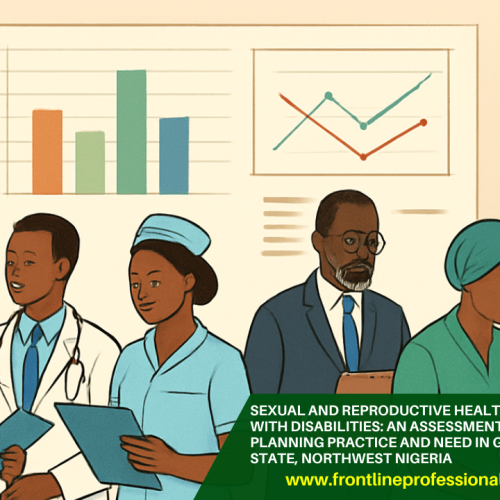Okeke I U, Aniemena C R, Okolie M N, Okeh D U, Okereke U C, Nnemelu P O,
Citation: Okeke I U, Aniemena C R, Okolie M N, Okeh D U, Okereke U C, Nnemelu P O,.(2025). Assessing the role of health education in improving school feeding program outcome in south-east Nigeria. Frontline Professionals Journal, 2(1), 106–127.
ABSTRACT
Background: School feeding programs (SFPs) have been implemented globally to improve school-age children’s educational outcomes, nutrition, and health. In Nigeria, SFPs have been integrated into the national education policy to address the challenges of hunger, malnutrition, and poor educational outcomes. Enugu State, located in southeastern Nigeria, has many school-age children benefiting from SFPs. However, the effectiveness of these programs is influenced by various factors, including caregivers’ willingness to pay, nutrition knowledge, and socioeconomic status. Health education plays a crucial role in improving SFP outcomes by: Increasing nutrition knowledge and educating caregivers about the importance of nutrition and healthy eating habits. Enhancing willingness to pay: Raising awareness about the benefits of SFPs, leading to increased willingness to pay for these programs. Improving health outcomes: Reducing the incidence of nutrition-related health problems among school-age children. Despite the importance of health education in improving SFP outcomes, there is a limited understanding
of its specific role in Enugu State. This study aims to bridge this knowledge gap by assessing the impact of health education on SFP outcomes in Enugu State.
Methodology: This study was a comparative, cross-sectional descriptive study carried out in the households of four (two urban and two rural) communities in Enugu State, South East Nigeria., involving. The sample size was 422 and participants were selected using a multistage sampling technique, the questionnaire was pre-tested semi-structured interviewer administered in the English language. It was adapted from the National Health Demographic Health Survey. Data were collated, assembled and analysed using (IBM), Statistical Package for Social Science (SPSS) version 23. Descriptive statistics as percentages and frequency were presented in tables. The mean and standard deviation of parameters in each community were obtained and statistical tests of association between the dependent and independent variables were also carried out and the level of statistical significance was set at P ≤ 0.05. The research protocol was reviewed and ethical approval Institutional Health Ethics Review Committee of Nnamdi Azikiwe University Teaching Hospital. Written consents were gotten from traditional rulers/ village heads before the commencement of the study and oral consent were sought from respondents. All participating respondents had the right to withdraw from the study anytime they wish without explanation and no consequences to them Confidentiality was maintained throughout the study.
Results: Most of the respondents were female 262 (62.4%) and 158 (37.6%) were males with
majority of the respondents having formal education 401 (95.48%) and 194(46.19%) completed
tertiary education. Majority of the respondents were household representatives 254(60.5%). On
Marital status of respondents 371(88.3) were married, followed by 34(8.1%) respondents that
were single parents. 159 of the 420(37.9%) respondents were government employee, 113(37%)
respondents were self-employed and 70(16.7%) of the respondents were unemployed. most of
the care givers in urban areas feed their children at school daily 151(72.25%) before health education and 146(69.86%) after health education. On why the care givers will like to enrol their child with school feeding program 156(74.64%) respondents indicated that it is based on the free provision of food for their children before health education and 143(68.42%) still indicated that after health education. On the likely reason that will make the care givers enrol their children for school feeding program, 164(78.47%) respondents were of the opinion that children look very tired after school. Most of the care givers in rural areas feed their children at school daily 52 (24.64%) before health education and 4(1.90%) after health education. On the likely reason that will make the caregivers enrol their children for school feeding program 66(31.28%) respondents opined that children look very tired after school Most respondents believed that the people needed to be involved in school feeding should be the school authority 163(77.99%) before health education and parents 124(59.33%) after health education. On likely place where the food should be prepared, 53(25.36%) of the respondents before and after health education felt it should be done within the school premises.
Conclusion: Assessing the role of health education in improving school feeding program
outcomes in South-East Nigeria reveals its significance in enhancing the overall effectiveness of
the program. Health education plays a crucial role in promoting healthy eating habits, improving
nutrition knowledge, and encouraging positive lifestyle choices among school children. Health
education is a vital component of school feeding programs in South-East Nigeria. By incorporating health education into these programs, policymakers and educators can promote healthy lifestyles, improve nutrition knowledge, and enhance the overall effectiveness of school feeding initiatives.
Keywords: Health education, school feeding program, school age, Caregivers







